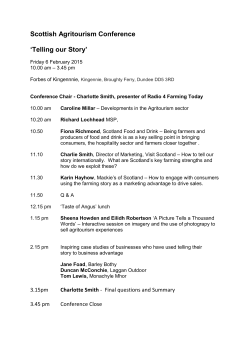
in europe work
IFSW European Conference and Social Services Expo 6-9 September 2015 Edinburgh www.ifsweurope2015.org Europe’s largest social work event in 2015 celebrating the achievements of Social work Partnerships in europe Organised by Media Sponsor Supported by We’re putting social work in Europe on the map – 2,000 delegates will exchange innovative practice skills, knowledge and expertise over the three day international conference and expo. This will be the largest social services event in Europe, held in Edinburgh, Scotland. We will be celebrating the achievements of social work partnerships across 40 countries and don’t want you to miss out. Find out more below and join us by booking your conference place now. Places are limited so to book go online to www.ifsweurope2015.org/register. Keynote address Prof Walter Lorenz Professor Walter Lorenz Walter Lorenz is Professor for Applied Social Science at the Free University of Bozen/ Bolzano in Northern Italy. Since 2001, he has coordinated a professional social work programme and has been Principal of the same university since 2008. A native of Germany, he qualified as a social worker at the London School of Economics and practised as a social work professional in East London before taking up a teaching position at University College, Cork in Ireland in 1978 where he became Jean Monnet Professor in 1995. His research interests include intercultural pedagogy, social pedagogy, comparative aspects of social work and social policy in Europe and quality standards in social services. He has published widely in these topics. Workshops The workshops will allow for in-depth study and all sessions will explore the themes of social work, partnerships and finding solutions, but will do so in the context of some of the social work specialisms. • Iain Brown, England; Restorative justice in action • Raquel Castro, France; Ian Johnston, Scotland; Lisen Julie Mohr, Norway; Dorica Dan, Romania; Putting clients with rare complex diseases “in the driving seat”: user focused training for social workers • Dr Tillie Curran, England; Leadership by experts in experience • Yehudit Gelbard & Shuvit Melamed, Israel; The effect of family interventions on the well-being of the patient and his family in mental health • Sophie Kershaw, England; New directions in care proceedings in England: what is the Family Drug and Alcohol Court model and how might this model be more widely embedded in the family justice system? • Ma'ayan Simon, Israel; Social work with the poor: from from a lack of ability to significant activity: clinical and other skills & techniques for working with poor people • Britt-Marie Johansson, Sweden; What's the use of having a medical social worker in the primary health care central? • Anne Cullen, England; Compassion in action: an experiential introduction to Schwartz rounds • Anne Beattie and Shaun Thomas, Scotland; Signs of Safety, a framework for assessment and planning in child protection • Pernilla Vera Jr, Mantha Kasagianni, Sofia Ågren, Sweden; Prevention against violence with MVP as method • Marianne Vinther Petersen, Denmark; Beating, thoughts and drawings • Tatjana Katkić Stanic, Štefica Karačić & Marijana Majdak, Croatia; Professional position and ethical dilemmas for the social worker in the judicial system • John Brennan, Ireland & Paul De Raeve; Realising the potential of information communication technology (ICT) to support people challenged by illness or disability to maintain independence • Miriam Sánchez Reyes, Spain; Traumatologia Social • Gunnlaug Thorlacius, Iceland; Perinatal services with families at risk • Kerry Cuskelly, Ireland; Rage against the disorder: being a critical and radical social worker in the Irish mental health system • Deirdre Mahon, Northern Ireland; The Safety in Partnership Approach – Nothing About Families Without Families • Ruth Kusec Fredriksson, Sweden; Neuropsychiatry in partnership with the municipalities and other authorities • Prof Yona Rosenfeld, Dorit Biran Deckelbaum, Tzafra Dweck, Brian Auslander, Israel; Social workers and social change: The Forum Against Poverty • Maria Adamovic, Sweden; The importance of capacitating staff to work with unaccompanied refugee youth at group homes • Maria Moritz, Austria; Minimum income in Austria: the Human Rights Dimension • Dr. Javier Simonovich & Ms. Esti Doron,Israel; Community social work in the 21st century: learning from three Israel experiences • Raymond Taylor, Scotland & Sebastian Kiedaisch, Germany; The impact of EU-governance on social work in different European countries • Natia Partskhaladze, Georgia; Georgia Child Care System Reform in Georgia and the role of social workers in achieving better outcomes for children and families • Margrethe Bennike, Denmark; Working with people who are refugees and suffering from PTSD • Scott Dunbar, Scotland; Keeping in touch. Contact guidance for looked after children • Gary Clapton, Viv Cree, Mark Smith, Scotland; Children in need of care and protection • Sharon Razon & Dr Lia Levin, Israel; ‘Power Centers’ and a practical suggestion for promoting actual partnerships: lessons from Israel • Felix Haggerty, Renfrewshire Council, Scotland; Change Fund (Reshaping Care for Older People) • Ana Radulescu, Romania; Social inclusion of ethnic minorities (Roma): access to labour market through Social Economy Projects • Joe Duffy, Northern Ireland; Working in partnership to develop international messages from service users and carers • Emma Cashmore, Gordon Dodds, Jacquie Robertson, Scotland; The benefits of Carer Support Payments • Hervör Alma Árnadóttir, Iceland; Experiential learning as a method working with young people • Dalija Snieškienė, Lithuania & Robin Moulster, Wales; Reflection on the deinstitutionalization of models of child care across Europe – what have we learnt? • Guðrún Jónsdóttir, Iceland; Victimization or empowerment, we have a choice! • Joy Gauci & others, Russia/Scotland; The contribution of transcultural social work in supporting partnerships with families and vulnerable individuals living in conflict • Ragna Björg Guðbrandsdóttir, Iceland; Children exposed to domestic violence • Luke Geoghegan & others, England; Asylum seekers and unaccompanied asylum seeking children • Vilborg Oddsdóttir & Sædís Arnardóttir, Iceland; From charity to empowerment and participation • Ia Shekriladze & Eka Chkonia, MD, PhD, Georgia; Social Work in Mental Health: international experience and Georgian reality • Bridey Rudd, Scotland; Personal outcomes in mental health • Valur Bjarnson, Iceland; The best way to implement Individual Placement Support • Herbert Paulischin, Austria/Romania; Social work and privatization • Coro Amunarriz Aranguren, Spain; Austerity and social work, the human dimension • Lesley Anderson, Cyrenians, Scotland; Curiously questioning: a co-creation approach to service delivery in a residential setting • Jeffrey Coleman, England; Principles of relationshipbased practice and child friendly justice • Nino Shatberashvili, Salome Vadachkora & Nika Kharebava, Georgia; Developing social work in criminal justice: Georgian and European experiences • Coro Amunarriz Aranguren, Spain; Austerity and social work, the human dimension • Valur Bjarnson, Iceland; The best way to implement Individual Placement Support • Jane Shears & Fran Fuller, England; Social work and safeguarding: implications for practice • Alesander Cala Cereijido, Spain; Leisure education in people with severe mental illness • Claudia Megele, England; Social work and social media: new opportunities and challenges for the future of social work practice and education • Brian Auslander, Israel; Collecting data from practice files: implementing the electronic record • Birgitte Rasmussen & Ninna Koefoed, Denmark; “Vi-Ka-Sku” (“Yes We Can”) Working with young people 18+ into adulthood • Olivia O’Connell, Ireland; Exploring the policy to practice gap: social workers’ experience of embedding child protection policy into their practice • Catherine Poulter, Wales; Social work with older people: good outcomes despite the bureaucracy • Ian Thomas, Wales; The relevance of minority languages in effective social work • Lisa Pattoni, Dee Fraser, Scotland; When it doesn’t work – working with failure in teams Explore new ideas and gain a wider vision of how social work can make a difference. www.ifsweurope2015.org www.ifsweurope2015.org The IFSW European Conference and Social Services Expo, 6-9 Sept 2015 www.ifsweurope2015.org Plenary Sessions Languages People will be working across many different languages. Simultaneous translation will be provided in French, German, Spanish & English for the main sessions and films may come with subtitles. The plenary sessions will explore the conference themes and include: Ethical Dilemmas in Care and Protection This session will look at human rights and social justice, in particular ‘whose social justice?’ Who Cares? Scotland and HUG Migration, Asylum Seeking & Trafficking Experiences of working in the refugee social services field in Turkey and about the services provided to refugees and asylum seekers by other organizations. This will include information on why asylum seekers opt to go to a third country, especially Europe, from Turkey and how human trafficking works and is growing. Huseyin Govercin, Social Worker Danish Red Cross, Turkey Social Work in and after Conflict Research and practice knowledge of social work in armed conflict and the transition to peace. Experiences from around the world including Northern Ireland and Bosnia. Professor Jim Campbell, Dr Reima Ana Maglajlic Social Work in Austerity This session will explore differences in social work provision to austerity across Europe Ana I. Lima Fernandez, Spain; Lára Björnsdóttir, Iceland; Dr Rory Truell, Secretary General IFSW Advances in health and social care Comparisons in social policy and practice across Europe. Mark Drakeford, Minister for Health and Social Services, Wales What will I be doing in 2025? The Institute for Research and Innovation in Social Services (IRISS) is a charitable company with a mission to: “…promote positive outcomes for the people who use Scotland’s social services by enhancing the capacity and capability of the social services workforce to access and make use of knowledge and research for service innovation and improvement.” IRISS Networking Sessions: Day 3 Day 3 of the Conference will be specialist seminars hosted by local organisations. They will form or build on existing networks for you to keep involved with after the conference. • • • • • • • • • Criminal Justice Children in public care Social work education Developing Services as we grow older Realising Human rights in social work Working with Roma families Substance misuse Migration and asylum seekers Learning disability Book before 30 April and get the Early Bird booking rate saving you £60 on the conference price. Go to www.ifsweurope2015.org/register for an instant place at this event. :VJPHS:LY]PJLZ,_WV 2015 :LW[LTILY ,KPUI\YNO0U[LYUH[PVUHS *VUMLYLUJL*LU[YL,0** Take time to look around this large exhibition and network with over 70 organisations. Explore resources, meet new suppliers and review new products and projects that will enhance service delivery. 60% of exhibition space has now been sold. To reserve your space call 01892 784804 or email ifsw@compassjobsfair.com
© Copyright 2025

















